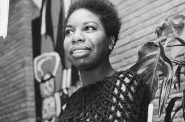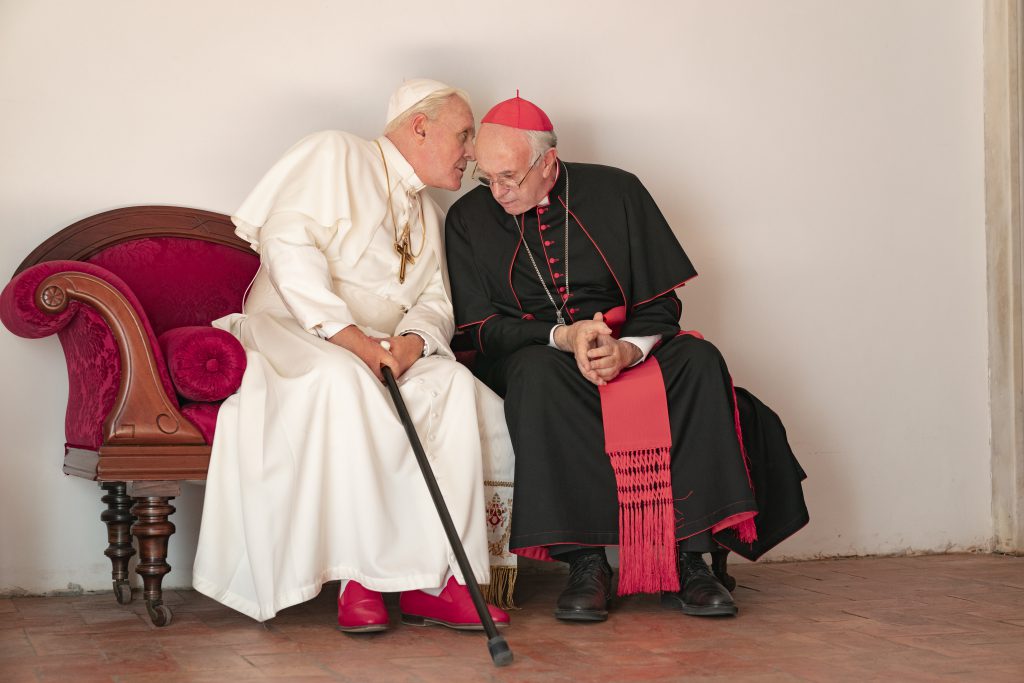Mischievous “Two Popes” Packs a Punch
And Jonathan Pryce deserves the best actor Oscar for his portrayal of Pope Francis.
There is a completely concocted moment at the papal conclave in 2005 that wound up choosing Joseph Aloisius Ratzinger as pope when he is in lunch line with then the second most popular candidate, Argentinean Cardinal Jorge Mario Bergoglio who is absently-mindedly whistling “Dancing Queen.”
Who is that by? asks German musical expert Ratzinger. “Abba” says Bergoglio, which is also the Aramaic name for Father not just the Swedish pop group, which clearly confuses the future pope.
It is an amusing setup for The Two Popes, an invented look at emeritus Pope Benedict XVI, who resigned in 2013 and had a pretty good idea who would succeed him, and the current Pope Francis.
(If anyone thinks the decisions of the Vatican can be mysterious and manipulative, consider the Oscar best supporting actor category and how it is trying to maneuver the voters. There they are parking big names like Brad Pitt, Al Pacino, Joe Pesci and Tom Hanks along with Hopkins!)
The second question: Is this just a dry theological debate for Catholics? Not at all. It may be invented, except for moments when actual statements or encyclicals are paraphrased as if emerging in dialogue, and it certainly assumes a relationship that current events may not support, given that some interpret the retired pope in real life attacking Francis for his views on priestly celibacy.
But in the heartfelt challenges between the two, when (in the film) Benedict brings Francis back to Rome to explore stepping aside, Brazilian director Fernando Meirelles raises notable issues of the roads to God and to power. Plus he allows moments back in time to reveal Francis’ conflicts with celibate life (perhaps making a dry point by not doing so much background for Ratzinger).
With and without subtitles, the movie drives seamlessly through multiple languages, with time to make a joke about Benedict being most comfortable in Latin. It’s an ideological representation, far from history, but despite the buddy movie criticism from critics, it does delve deep and honestly into many issues we wish the two men would discuss!
In fact, these conflicts strengthen the sense of humility among pomp that two popes had to debate (though probably not so openly) in what remains a remarkable dual argument about the church’s future. In real life, it does seem that Benedict has grown healthier and more open since stepping aside and that Francis has found a more formidable voice of leadership — both realities that fit this manufactured exchange.
The movie more weakly suggests that soccer brings the men together, but The Two Popes lives and breathes on the moments of humanity the actors find under the robes and formal prayers, with Pryce particularly natural in how he achieves that outcome. A simple meander in the garden by him speaks volumes.
Dominique Paul Noth served for decades as film and drama critic, later senior editor for features at the Milwaukee Journal. You’ll find his blog here and here.
Movies
-
Milwaukee Film Festival Returns in April
 Mar 27th, 2024 by Sophie Bolich
Mar 27th, 2024 by Sophie Bolich
-
Nina Simone’s Summer of Soul
 Nov 29th, 2022 by John Sieger
Nov 29th, 2022 by John Sieger
-
The Surprise Pick for Best Picture
 Mar 22nd, 2022 by Dominique Paul Noth
Mar 22nd, 2022 by Dominique Paul Noth
Review
-
New Musical a Life and Death Comedy
![Stephanie Beschta [Mrs. McCobb] and Shayne Patrick [Mr. McCobb] in RIP – A Matter of Life and Death. Photo by Stacy Kaat (www.stacykaat.com).](https://urbanmilwaukee.com/wp-content/uploads/2024/07/WEB-6056-185x122.jpg) Jul 19th, 2024 by Dominique Paul Noth
Jul 19th, 2024 by Dominique Paul Noth
-
Ouzo Café Is Classic Greek Fare
 May 23rd, 2024 by Cari Taylor-Carlson
May 23rd, 2024 by Cari Taylor-Carlson
-
‘The Treasurer’ a Darkly Funny Family Play
 Apr 29th, 2024 by Dominique Paul Noth
Apr 29th, 2024 by Dominique Paul Noth





















